
To Rory Stewart, Defra
Dear Minister
The government response to the e-petition to ban driven grouse shooting is simply awful. It is partial and inaccurate. I have previously asked Defra whether responses of this sort are seen and signed off by ministers and have never received a response. Did you sign off this response? Did one of your ministerial colleagues? And do you take responsibility for it?
Given that you have had, as requested, a copy of my book Inglorious on this very subject, I would have thought that the government response might have been a bit more carefully written. Have you read Inglorious yet, by the way?
Here is a first pass at the government response. There some things that really ought not to be in this response – if only IPSO covered matters of this sort then I feel sure that we could press Defra to make a corrections and apologise. And that is what the department should do anyway.
Defra is working with key stakeholders to ensure the sustainable management of uplands, balancing environmental and economic benefits,
Balancing environmental and economic benefits – you do realise that many of the environmental benefits of the uplands are statutory and legal requirements, don’t you? There is no question of balancing the environmental goods such as favourable condition of protected sites and protected species with economic activity. It is Defra’s job to ensure that Natura 2000 sites are in favourable conservation status and that Hen Harriers and other protected species have favourable status too. Would you agree? This response is not suggesting, or is it, that this government is relaxed about trading off legal environmental requirements for short-term economic gain?
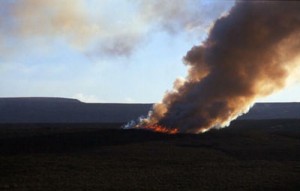
…which includes the role of sustainable grouse shooting.
Sustainable grouse shooting – how does Defra define that? I think this is a phrase that you have just invented. Would you not agree that sustainable grouse shooting, if it could be defined, would be grouse shooting that did not damage the environment? Or do you have another definition? Given that the UK is currently dealing with a complaint to the EU over damage to protected blanket bogs right across northern England due to grouse moor management (did you see Martin Harper’s blog today?) and that English Hen Harrier breeding populations are more than 300 pairs below their potential level (according to a statutory agency report) and that protected Peregrine Falcon populations are routinely persecuted on English grouse moors and that rivers whose catchments are dominated by driven grouse shooting have reduced aquatic biodiversity and are more polluted and are more prone to flooding, and that the Committee of Climate Change has just recently criticised the management underpinning driven grouse shooting thus ‘The damaging practice of burning peat to increase grouse yields continues, including on internationally protected sites.’ I suggest that we are far away from sustainable grouse shooting and are getting further away from it with every year that passes. How does Defra define sustainable grouse shooting, and how prevalent is it in the real world? It doesn’t seem that you have got to the end of Chapter 5 of Inglorious yet?
When carried out in accordance with the law, grouse shooting for sport is a legitimate activity…
When carried out accordance with the law, grouse shooting…is a legitimate activity – come on Minister, you wouldn’t have got away with this when you were at Eton, let alone when you got to Balliol, would you?
…and in addition to its significant economic contribution, providing jobs and investment in some of our most remote areas, it can offer important benefits for wildlife and habitat conservation.
Grouse shooting can offer important benefits for wildlife and habitat conservation – it could, but does it? In particular, does it deliver nett benefits or does it just offer some benefits that are vastly outweighed by the disbenefits? What is your position on this – and is it the position of the foxes, stoats, blanket bogs, mountain hares, raptors and native woodland? This statement is in the same category as ‘Hitler wasn’t all bad’ – it might be true but it isn’t important.
The Government’s position is that people should be free to undertake lawful activities should they wish to do so.
The Government’s position is that people should be free to undertake lawful activities should they wish to do so – that’s big of the government! Gee! Thanks!
However, we encourage all shoot managers, owners and their staff to follow best practice to reduce the chances of a conflict of interest with birds of prey.
What form does this encouragement take please? Of what, precisely, does this practice comprise? The conflict of interest between driven commercial grouse shooting and birds of prey is a biological inevitability – the birds of prey eat the grouse the killing of which grouse managers want to sell to clients. Defra must surely be aware of the Langholm study? If not, you will find an account of it in Chapter 3 of Inglorious.
The overall environmental and economic impact of game bird shooting is a positive one…
The overall environmental and economic impact of bird shooting is a positive one – you are in trouble here Defra. You used this phrase in your response to John Armitage’s e-petition calling for licensing of shoots and I pointed out that it was not backed up by evidence then. In reply to a letter from my then (and excellent) MP, Andy Sawford, asking for the evidence on ecological costs and benefits of releasing pheasant and red-legged partridges into the countryside Defra replied they didn’t have any evidence and had no plans to collect any. So why have you resurrected this phrase for this response? It’s probably because you aren’t really trying to base your response on evidence and that you, for some reason I can only guess at, are taking the side of the shooting industry rather than looking at this matter objectively. You should correct your response. If IPSO had jurisdiction here, I bet they’d make you!
…and it has been estimated by the industry that £250 million per year is spent on management activities that provide substantial benefits for conservation.
Estimated by the industry… – and you as government take that as true do you? Why? As you know, those industry estimates have been taken apart by economists (funded by Animal Aid, instead of funded by the shooting industry) on the grounds that they are overestimated by a factor of around fourfold and that they include public money (taxpayer money) that would be spent elsewhere and perhaps to greater benefit, if not in this way. Why does a government department simply regurgitate industry figures without checking them? You are the Daily Telegraph of government departments it seems – failed to check figures given to you by a single source which happens to be the shooting industry. Defra should correct this bit of its response. You may find Inglorious (pp 229-30 and references at the back) of value here.
For grouse shooting in particular, according to the Moorland Association (http://www.moorlandassociation.org/economics3.asp) estates in England and Wales spent £52.5m on managing 149 grouse moors for shooting in 2010; Scottish landowners manage a further 150 moors for shooting grouse. The industry also supports 1,520 Full Time Equivalent jobs and is worth £67.7 million in England and Wales. In Scotland grouse moor management is estimated to be worth £30 million per year.
You are here again taking the industry figures as true and accurate. Why? Have you checked them? But, in any case, these figures do not take into account the externalities of economic costs and loss of value of natural capital, do they? (No they don’t!). The external costs include increased greenhouse gases (as referred to by the Committee on Climate Change above), increased flood risk (and house insurance costs), increased particulate matter and acidification of catchments (and increased water bills for the consumer), damaged landscapes which are burned in unsightly geometric shapes and loss of wildlife which is part of our natural heritage. How much do these add up to? What is the nett effect? Do you have any idea? At any conservative estimate the externalities far outweigh the economic activity of grouse shooting. And moreover, Minister, the money spent on grouse shooting would not disappear from the economy if not spent on blasting birds out of the sky – rich shooters will spend their money in some other way, perhaps not in the same geographic localities, but the money will not be lost to the economy if grouse shooting disappeared tomorrow. Would it? There’s quite a lot about all this in Inglorious Chapters 4 and 5 – have you got that far Minister?
Grouse shooting takes place in upland areas and the Government is committed to helping create a more sustainable future for the English uplands. They are endowed with natural assets that are important for delivering a range of valuable “ecosystem services”, including food and fibre, water regulation, carbon storage, biodiversity, and recreational opportunities for health and wellbeing.
With regards to carbon storage in particular, the Government recognises the significance of peat as a natural carbon store and acknowledges that historic land use and management has caused degradation of UK peatland and resulted in the loss of stored carbon. The last decade has seen increasing numbers of conservation initiatives (such as Nature Improvement Areas and Sites of Special Scientific Interest) which have halted the loss of and re-established areas of peatland in UK and therefore reduced the loss of peat stored carbon.
The Government is also taking measures to protect peat including the pilot Peatland Code. The pilot Peatland Code was launched in September 2013 with the aim of promoting the restoration of UK peatland through business investment. It is hoped the Code will assure restoration delivers tangible benefits for climate change alongside other benefits such as restoring habitats for protected species and improving water quality.
In response to the three paragraphs above – yes, but banning driven grouse shooting would solve many of these problems at source and at a stroke. You aren’t making much progress on these issues, because you are far too wedded to market solutions. The economic ‘benefits’ of grouse shooting accrue to a small number of land owners – the costs accrue to a large number of taxpayers and the public in general. This is a classic case where government needs to intervene to prevent the selfish interests of a minority overriding the public good. Defra is not doing its job and the suspicion has to be that this is partly because those few beneficiaries of the current unsustainable system are supporters of the present government.
Defra will also be investing over £3 billion in agri-environment schemes (Environmental Stewardship and the new Countryside Stewardship scheme) in the next Rural Development Programme 2014-2020.
You will, will you? Just remember that is my money, and the money of all taxpayers, and it should be spent for public good not private profit. And actually, that sum is surely for England as a whole – a very small proportion will be spent in the uplands, and an even smaller proportion spent on the issues under discussion here.
Addressing loss of biodiversity will be a priority for the new scheme. In addition, and as a core element of the approach to securing synergies across a wide range of rural habitats, funding will look to maximise opportunities to deliver biodiversity, water quality and flooding benefits together.
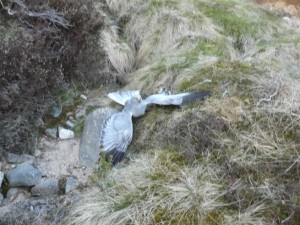 In response to the issue of illegal killing of protected wildlife, the Wildlife and Countryside Act 1981 affords protection to all wild birds and certain other species. Despite the protection afforded to birds of prey, such as the hen harrier, incidences of illegal killing of birds of prey continue to occur. To address this, senior Government and enforcement officers in the UK identified raptor persecution as a national wildlife crime priority. The National Wildlife Crime Unit, which is part-funded by Defra, monitors and gathers intelligence on illegal activities affecting birds of prey and provides assistance to police forces when required. Despite instances of poisoning and killing of birds of prey, populations of many species, such as the peregrine, red kite and buzzard have increased.
In response to the issue of illegal killing of protected wildlife, the Wildlife and Countryside Act 1981 affords protection to all wild birds and certain other species. Despite the protection afforded to birds of prey, such as the hen harrier, incidences of illegal killing of birds of prey continue to occur. To address this, senior Government and enforcement officers in the UK identified raptor persecution as a national wildlife crime priority. The National Wildlife Crime Unit, which is part-funded by Defra, monitors and gathers intelligence on illegal activities affecting birds of prey and provides assistance to police forces when required. Despite instances of poisoning and killing of birds of prey, populations of many species, such as the peregrine, red kite and buzzard have increased.
The level of illegal persecution is still unacceptably high – wouldn’t you agree? What level of wildlife crime would be acceptable to Defra? The human population is increasing but trapping, poisoning and shooting are still regarded as crimes across the world – aren’t they? What level of Hen Harrier and Peregrine population is Defra aiming to achieve?
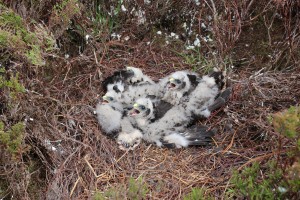
With regards to hen harriers, it is encouraging to learn that there were six successful hen harrier nests this breeding season, fledging 18 chicks, figures which show it is on track to be the most successful year since 2010.
It is, isn’t it? What a shame then that so many males have disappeared under suspicious circumstances this year. Given that the statutory agencies estimate that the English uplands could have 330 pairs of Hen Harrier if these birds were not illegally killed, how many pairs of Hen Harrier would Defra like to see in England? How many pairs of Hen Harrier would Defra wish to see in the SPAs that were 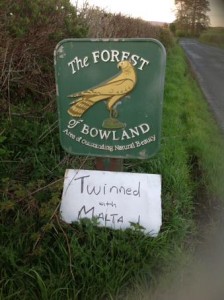 designated with Hen Harrier as part of their biological interest – to remind you there should be at least 13 pairs of Hen Harrier in the Forest of Bowland SPA (and they shouldn’t be mysteriously disappearing) and this year there were six nests (and several males did disappear). We should celebrate some movement in the right direction – but Defra should not look and sound so complacent and should be taking greater steps to rectify the Hen Harrier deficit in England. Inglorious covers this in Chapter 1 (and elsewhere) – you must, surely Minister, have got to Chapter 1?
designated with Hen Harrier as part of their biological interest – to remind you there should be at least 13 pairs of Hen Harrier in the Forest of Bowland SPA (and they shouldn’t be mysteriously disappearing) and this year there were six nests (and several males did disappear). We should celebrate some movement in the right direction – but Defra should not look and sound so complacent and should be taking greater steps to rectify the Hen Harrier deficit in England. Inglorious covers this in Chapter 1 (and elsewhere) – you must, surely Minister, have got to Chapter 1?
The Uplands Stakeholder Forum Hen Harrier Sub-group was set up in 2012 with senior representatives from organisations best placed to take action to address the decline in Hen Harriers. These include Natural England, the Moorland Association, the National Gamekeepers’ Organisation, the Game & Wildlife Conservation Trust, National Parks England and the RSPB. Defra welcomes the involvement of all parties.
The Sub-group has developed a draft Joint Action Plan containing a suite of complementary actions intended to contribute to the recovery of the hen harrier population in England. We are working with Sub-group members to finalise the Plan. Does the plan include a massive increase in the number of satellite-tagged Hen Harriers in order to deter illegal killing and aid detection of crime and criminals?
I ask you again Minister – did you sign off this response? Because it is a poor response. It is partial and inaccurate. It looks as though Defra is a rather poor public relations machine for the shooting industry.
We, the taxpayers and voters will remember this and we are watching your future action. Please remember you work for all of us, not for the shooting industry.
In the meantime, please watch the number of signatures continue to rise as the public demands that you ban driven grouse shooting.
[registration_form]
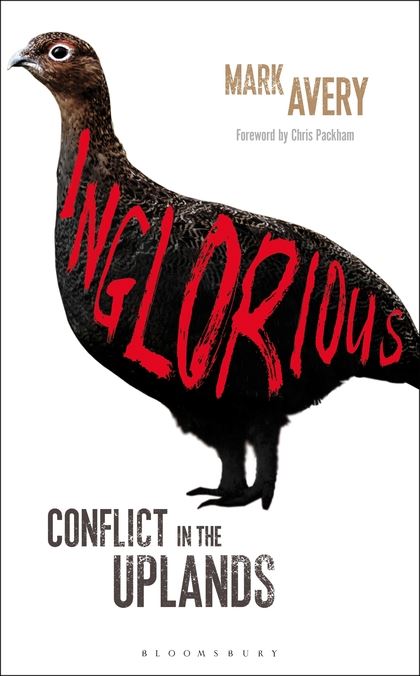
I almost feel sorry for Rory Stewart after that. Almost. Well done Mark!
Hi Mark, it all just makes me wonder if anybody in government at Westminster has the integrity and impartiality to lead on this issue-or any conservation issue actually. The easy option is to always quote the likes of Defra without looking too closely at the vested interests that are all too readily apparent to anybody who cares to probe. History is repeating itself, in as much as the landowners and business still have the ear of the law makers. Benny Rothman would recognise it 83 years on. Although I suspect you would never condone it (at least in print), I feel repeated mass trespass during driven shoot days is what it will take to bring this obscenity to the attention of a largely appathetic nation.
I await you thoughts with interest.
If this is really addressed to the Minister it does perhaps sound a bit to much like a rant? I fear that making him loose huge amounts of face if he does “back down” from the Defra response may not be the best way to get him to change his mind.
I’d be surprised if he did sign this off before it was sent – so a “please re-examine this response sent in your name” tone might be better than “WHAT KIND OF IDIOT ARE YOU THAT YOU SENT ME THIS?” . The former gives him a chance to look authoritative and in charge, I think your missive on the other hand requires him to admit to incompetence. No-one, and esp no politician, will do that if they can help it. He seems like the best Minister likely to be on offer for a while, so cultivate him, don’t insult him.
I’ve written the odd letter like this myself over the years. I’ve learned through bitter experience that its best not to actually send them.
I think that Mark’s reply to the DEFRA response is measured, analytical and polite. He asks all the right questions which have all been thoroughly researched in his book, Inglorious. The Minister might also get a deeper insight by reading Mark’s conversation with Prof. Ian Newton in his book (with Keith Betton), Behind the Binoculars.
Well said. Play the ball and not the man Mark. Give him a chance, don’t alienate him.
I don’t imagine Rory Stewart will find it comfortable reading but it can hardly be described as playing the man rather than the ball.
Don’t undermine your argument with a churlish approach then.
Exactly what I was thinking. It’s a lengthy promotion of his book rather than a genuine attempt at lobbying. Could have presented this evidence with slightly less finger wagging and without the barrage of rhetorical questions and would be much more likely to get a meaningful response. If you read that letter as an MP you’re fairly likely to ignore it because doing otherwise might get you into a public spat about a controversial issue. What could he gain by attempting to answer the hundred questions you pose? Needs to be focussed and non threatening while containing the same key message. Write it as if you expect to get a response.
I’m not saying you’re wrong, you’re absolutely right, and he should respond either way, but he’s not in a position where he has to, yet. If you really want change then you need to open up dialogue not close it down.
Tim – thank you so much for the advice.
Thanks for filling in the detail, Mark. I haven’t yet read Inglorious, but even without your extra scrutiny, I was surprised at what a poor response this was. It amounts to little more than saying legal things aren’t against the law (no sh*t, Sherlock), and that it’s all OK because the market is in charge. Feeble at best. Ingenuous at worst.
Still laughing my head off, which I really shouldn’t be. Brilliant response, though I dread to think what will come back (if anything).
Wonder what Mr Corbyn would make of it all?!
Keep up the good work, Mark!
No one should have be too surprised at the response provided by this Tory Government. Yes the reply provided is a total disgrace but what did anyone expect from a Tory government supported and funded by influential shooting interests. It has already been mentioned by others, many Tory MP’s and their political supporters either take part in shoots or they own shooting estates, for example Richard Benyon. Most if not all of these individuals have a vested interest in ensuring their shoots runs smoothly and any game predating raptor is given short shrift. (This was a well know quote written by Dr Derek Ratcliffe within his book the Peregrine Falcon.) Derek’s words are as true now as when he first published his book.
I have come to realise over the 48 years I have been involved with trying my best to help raptors the legislation intended to provide their protection and security throughout England’s uplands is a sham, not worth the paper these laws are written upon. It’s abundantly clear SPA legislation designed to provide suitable habitat for breeding hen harrier across many parts of our uplands, is either being disregarded, mismanaged or a combination of both by many shooting estates.
Take licenses provided by Natural England or the BTO enabling raptor workers to legally visit occupied schedule 1 raptor nests. A sensible idea most people would think designed to prevent nest visit duplication and ensure breeding birds and their nests are not subjected to undue disturbance or persecution. Legislation did not help protect nests provided with around the clock protected from where the male hen harrier disappeared in the Forest of Bowland or on the RSPB’s Geltsdale Reserve in Cumbria this year. Legislation did not prevent the abandonment of over sixteen occupied peregrine territories which had been established on grouse moors in the Forest of Bowland between 2009 and this year. Nor have these laws prevented the loss of most of the resident pairs of nesting eagle owls from the Forest of Bowland or from the single territory in the northern Pennines.
It’s ironic, moorland gamekeepers patrolling their upland beats almost on a daily basis during the breeding season can expect to come across schedule 1 raptor nests either by design or by coincidence causing disturbance to the nests they encounter. These individuals are not licensed nor are they asked to apply for a licence ensuring their actions comply with existing legislation. These individuals are rarely if ever prosecuted, in fact I would go so far as to say the authorities are well aware of what has been allowed to take place but choose to turn a convenient blind eye. If it was a case of walking away and leaving the nests found in tact I could accept that, but all too often nests located on grouse moors are quickly destroyed, or simply disappear. This is the main reason species like hen harrier, peregrine falcon, goshawk and short-eared owls are conspicuous because of their almost total absence from these area today, and the position is becoming much worse.
What a shame the Tory Government by their reply chose to ignore the plight of the hen harrier on moorland where red grouse are shot. I just hope like many others who have supported Mark Avery’s petition this administration comes to regret their failure to grasp a golden opportunity by at least trying to put an unacceptable situation right.
It’s pretty clear this government aren’t going to do anything constructive, no surprise there. The question is, therefore, how to vote them out. In that respect, Corbyn’s victory was a big setback for conservation.
correction, the big set back was the election of the Tories in May.
That Labour are trying a different approach to that which failed this country in May should not be regarded as the problem.
The Tories have always depended on divide and rule. They prefer the liberal / left to do their nay saying for them.
Remember this boy speaks 14 languages and I recently told him that he does not speak the language of nature! Hopefully he will soon translate this into natures way as he is tipped to be a future Prime Minister.
Hope the letter/email was copied to Kerry McCarthy!
Excellent dissection Mark.
My only criticism is to allow the claim that an increase in Hen Harrier numbers in 2015 is positive.
OK it is positive in that they have not completely wiped out all of the English population but that probably owes more to the tenacity of the species than anything.
Raptor Persecution Scotland had a good blog post on this subject.
https://raptorpersecutionscotland.wordpress.com/2015/08/05/six-successful-hen-harrier-nests-in-england-this-year-some-perspective-please/
Natural England’s report A Future for the Hen Harrier in England?
http://publications.naturalengland.org.uk/file/81030
has a graph of the English breeding figures 2002-2008 showing number of chicks fledged. There were 18 fledglings in 2015 but this figure is well below the lowest year in the 2002-2008 study period, when the lowest year 2002 had about 21 fledglings. In that same study the best year was 2007 which had about 42 fledglings. A drop from a recent peak of c42 in 2007 to 18 in 2015 is not what i call good news, a dramatic increase year upon year (like Langholm) would be.
That’s not a response, that’s just the same old hackneyed whitewash they drivel out when anything attacks their beloved grouse shooting. If we could get the RSPB to point out to it’s more than one million members how serious a problem the persecution of birds of prey has become in the UK and urge them to sign the petition, we could easily achieve the 100,000 signatures needed to make this government sit up, take notice and discuss in parliament this very serious illegal raptor persecution issue that’s taking place on the grouse moors estates every day !!!
…but how many of that million are of an age whereby they do not have an e mail address from which to vote or share one with a spouse?
If only a quarter of them or less have an email address and signed the petition it would be more than enough to make the government take notice !!!
I fully agree, Rod, just mourning the host that can’t and contemplating travelling round and enrolling them with an e mail address for just these sort of occasions!
Your response to DEFRA Minister, Rory Stewart is excellent, I would definately like to be sitting at the other side of his desk when he reads it, (that’s if he does read it himself of course). There is just one thing I would like to add to your response, my signature to endorse it to the minister.
Excellent response Mark. I do hope you chase for a reply!
Re Rod Foster’s comment on the RSPB, strangely, that’s the second time you’ve heard that today isn’t it, my email earlier? Even if Mr Angry is right (and I suspect he is), let’s halve their membership to say, 500k, you’d still get your extra 80k signatures. Might be time to call in a favour? Or how about winding up the birding press to help? Maybe the Telegraph would help out? Er, ok, maybe not them then.
Maybe we all need to shout LOUDER. Four short months to find another 80k votes and make Mr Stewart give a proper response.
I emailed 12 Scottish local RSPB groups with the link to the petition asking that it be circulated to their members and hopefully signed. Two got back to me and said they’d done so. The other ten not a squeak, maybe they had too, but feel that is being optimistic. I had stressed I am a RSPB member myself. The membership just don’t like doing any form of campaigning even signing petitions. Very frustrating. Even some Friends of the Earth Scotland members have been worried about so called ‘complexity’ of the situation (but it’s very simple), supposed loss of jobs etc and thereby didn’t sign. I think it would help if an outline was drawn up showing how things could change, more jobs be created, forms of forestry better for wildlife, but still ‘productive’ etc. I’d love to see a document along the lines of ‘Grouse without Grouse Moors’ showing how red grouse exist without muirburn in other countries, their rural areas have more wildlife and more jobs. Why aren’t other countries taking up grouse moors if they are so good for wildlife and the rural economy? Conservationists and their representative organisations can be lambasted (e.g the ludicrous ‘Isles of the West’ by Ian Mitchell) as being uncaring re people – utter nonsense. It’s probably the fear factor re damage to rural economy, all the propaganda from the shooters that’s holding a fair few folk back. Ironically it’s the dominance of the sporting estates that’s contributing to rural areas being crap for jobs, grouse moors are little good for anything apart from burnt heather and parasite riddled grouse.
Four months 80k signatures Paul are doable, but a proper response from Mr Stewart, do you really think so?
As usual, you pull the opposition to pieces. Well done Mark. I live in the NW, and so I resent what is being done in our area, and what outsiders must think of us.
THEY ARE NOT DOING IT IN MY NAME.
While its an excellent rebutle, I think it opens up too many fronts at one go. It might be better to tackle one ridiculous claim at a time… it gives them less room for omission and obfuscation.
I will be seeking clarification on “benefits for wildlife and habitat conservation”. This is such a preposterous claim, I wan to know what lies behind this claim.
As a former critic of the RSPBs inaction as I then see it I think it only right that I defend their position as I now see it after speaking with Mike Clarke at Hen Harrier evening meeting.I think no outside petitions are likely to get any serious publicity from RSPB for lots of reasons that the RSPB will only talk about privately and are quietly following there own way of trying to stop illegal killing.
Mike Clarke in my opinion is as dedicated to stop this illegal killing as anyone and was very impressive at the evening meeting in Buxton.
Of course I realise he will say all the right things when talking to individuals but his sincerity of eventually stopping illegal raptor persecution is plain to see.
I’ve always been convinced of RSPB commitment on this issue just disappointed sometimes in the way it is expressed. There is no doubt at all that the DEFRA response is woefully inadequate, too bloody lazy even to actually check facts, as many they quote are already disproven. One feels insulted at this slovenly response, it smacks of a complete lack of respect. I hope that the minister responds to Marks excellent critique but I will not be holding my breath.